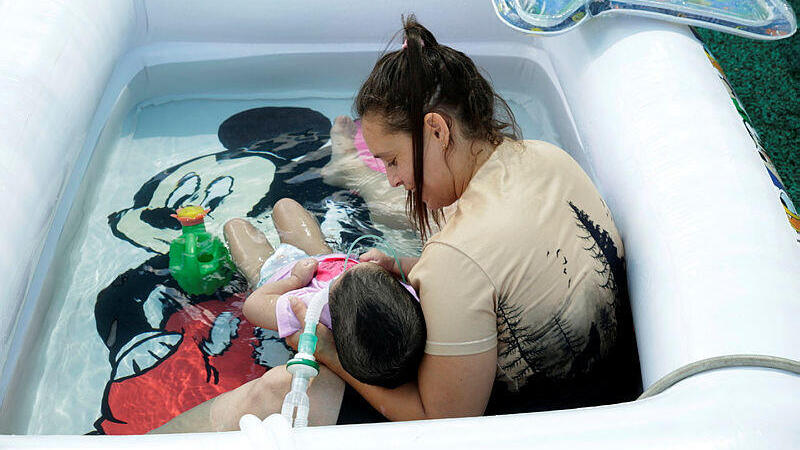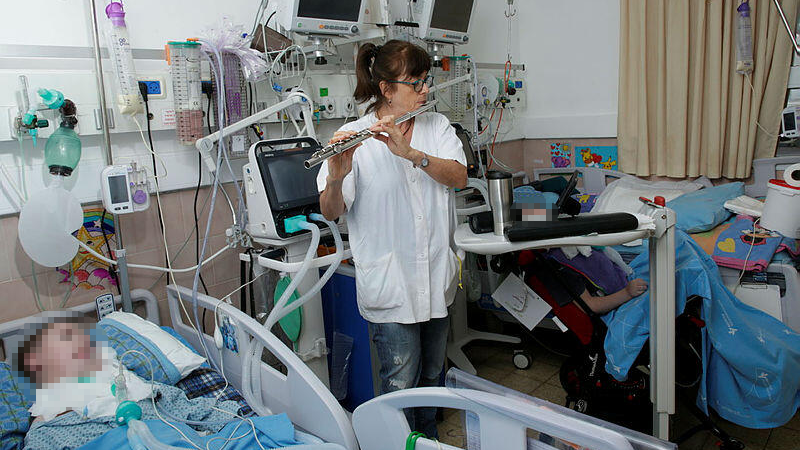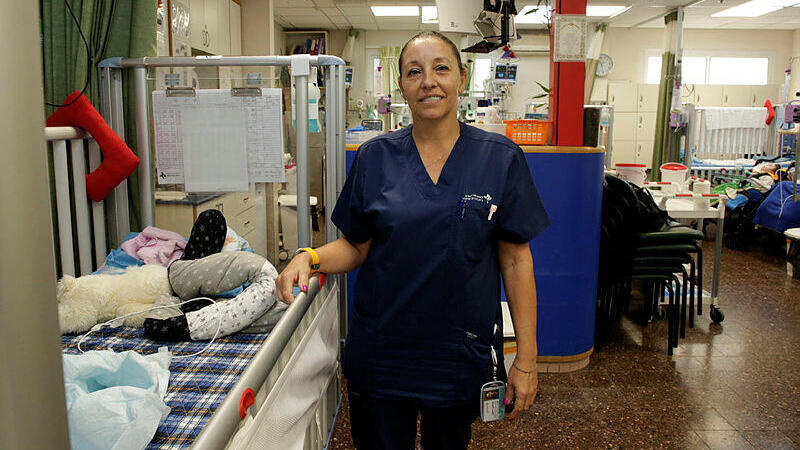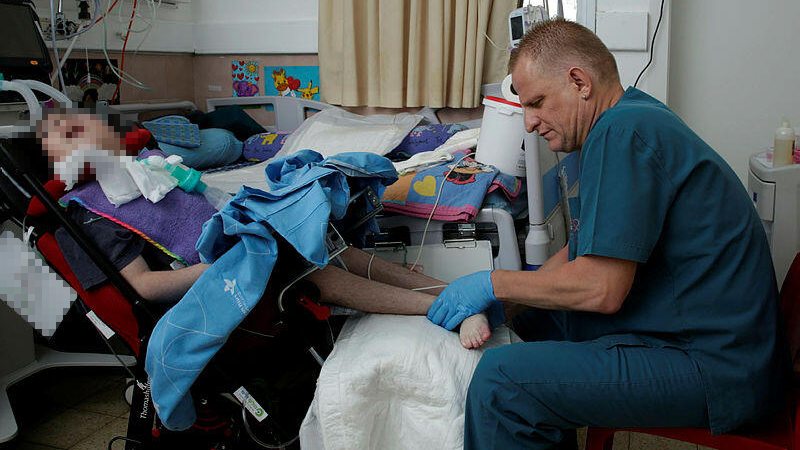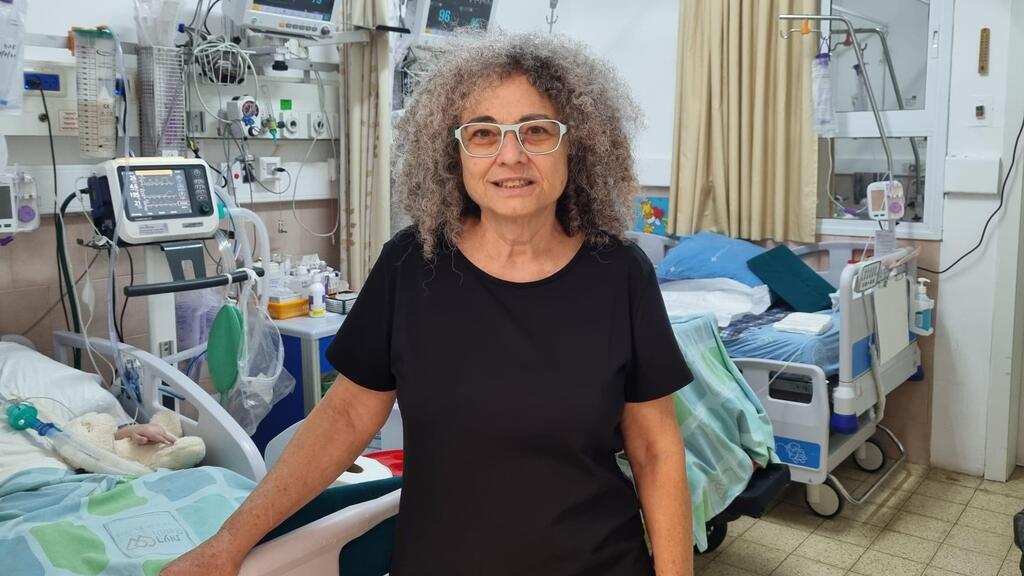Getting your Trinity Audio player ready...
In a bed at the end of the children's ward in the Reuth Rehabilitation Hospital in Tel Aviv lies a four-month-old infant who hasn’t responded to touch or pain since he was a month and a half old after surviving sudden infant death syndrome.
To his right is a three-year-old ultra-Orthodox child in a half-reclining position in a car seat-like device. He arrived at the ward after birth when doctors identified a congenital chromosomal defect that caused abnormal growth of his organs. His face is swollen and large and his eyes are bandaged to prevent dryness.
Each of the 28 cribs and beds in the two children's wards tells the tragic story of the young patients and their families. "We aren’t a rehabilitation ward," clarifies Liana Achitov, head of the Reuth Rehabilitation Hospital’s children's ward. "We received the children in their current state and our job is to maintain their health."
Achitov, who’s married and a mother of three, has been in this challenging ward for 22 years. "I came here professionally mature with 13 years of work experience, including in intensive care. Honestly, I was immediately captivated by the therapeutic challenge, but it took me time to learn the complexities and nature of the work."
As she adapted, she says she fell in love with the children. "I wouldn't trade them for anything. They’re my babies, my home." Most of them are unconscious or have minimal awareness, with a large number on ventilators.
The ones in better condition respond to minimal stimuli. The children represent every segment of Israeli society: secular, religious, ultra-Orthodox, Arab, children of foreign workers and even children from the Palestinian Authority.
Our role is to maintain them with dignity and health, not to rehabilitate them. But when one out of ten opens their eyes, an event that others might see as rare, it’s rewarding and exhilarating for us to the point of euphoria.
The young patients with lost cognitive function are called "the ward’s children," and they’re played music, read stories and given a summer camp experience by staff. "Our basic approach to each of them is as if they were a regular child, even though they aren’t rehabilitative," Achitov explains.
"Our role is to maintain them with dignity and health, not to rehabilitate them. But when one out of ten opens their eyes, an event that others might see as rare, it’s rewarding and exhilarating for us to the point of euphoria. The stimuli we provide, such as the pool on the roof of the building, have been proven to benefit their physical indicators: blood pressure, respiration and pulse rates.”
“I don't know what they understand and feel if anything, but I have to treat them as if they, at the very least, deserve this chance, to emerge even a little from the deep abyss into which they’ve fallen,” she adds.
This therapeutic approach permeates the various specialized staff members and compassionate care involves a lot of gentle touch and love. "You can't work in a place like this without having a good heart," Achitov says.
The morning routine includes changing, bathing, dressing, feeding and administering medication that can’t be taken orally. Some children remain in bed, while others are in a semi-reclined position in a stable seat. Achitov accompanies us on a tour of the ward, which is exceptionally clean at any time of day.
The children are well-groomed, and despite all being diapered, there isn't a hint of bad odor. The children in the ward are in a vegetative state and have lived for years in well-kept, light-filled rooms.
In one room lies Guy (an assumed name, like the other children's names), a seven-month-old who drowned in his home bathtub. He was rushed to the hospital without a pulse, and after being resuscitated, his vital signs returned, but his cerebral cortex didn’t recover.
Next to him lies Itay, a seven-year-old who choked on a gummy candy while playing with his friends in the park. It's hard to process that many of them were born healthy. This sadness is also present with Ilay, who, at two and a half years old, ran out of the house to greet his father, who was reversing the car and didn't see his son. The impact of the bumper on his head caused him to lose consciousness, which hasn’t returned since.
How do you handle the initial meeting with parents? "Each set of parents receives an explanation tailored to how much they wish to know. The common way for me is that I don't smother their hope, nor do I deceive them. I tell them that we'll update them on any small change immediately and add, in an informative tone based on statistics, that if no change occurs within six months, the situation is considered unrehabilitatable."
'Some families fall apart'
How often do parents visit the ward? "There’s a child here whose parents decided to focus on their healthy children and even expand the family, opting to forgo, and I say this without judgment, visiting their non-responsive child. We don't get angry, criticize, or judge any parental decision.”
“The struggle of having a child who doesn't respond to a parent is hard to describe. Other parents come every two weeks, once a month, or not at all. In another case, the brother of a patient visits. We have children from Nablus, Jenin and another town in the Palestinian Authority,” she adds.
“After they’re granted permission, the parents come for up to a month and we accommodate them by arranging a fully equipped family room on the hospital grounds. We also cover their meals."
Do parents share their state of mind and what they go through? "Certainly. Some families fall apart. Many of them get divorced, and in most cases, only one parent visits. Some say it was a mistake to save their child and that they hope the suffering will end as quickly as possible. Some parents ask us not to resuscitate their child.”
“For example, the parents of a nine-year-old girl, asylum seekers from Eritrea. The father fled to another country and the mother requested that we let the child be. We complied. She’s now defined as a palliative care patient, meaning we continue with life-supportive care: connecting her to oxygen, food and medication.
“If a suspicion of an infection is raised, for example, we won't take a blood test or change her medication. The mother struggles to see her daughter in this condition and when she does visit she barely musters the strength to enter the room for a few minutes."
Achitov is well aware of the limited potential of all the alternative treatments she ensures are provided to the children. Yet, from her well-experienced belief, investing in these children rewards everyone involved.
"The brain is still a complex and mysterious entity and science doesn’t fully understand what’s going on within it," she says. "Often, we receive children who seem lost and beyond hope and they’re the ones who smile — whether as a response or reflex. Because of this, I prefer to invest in all of them and live off the occasional, small victories."
Achitov refers to physical therapy, occupational therapy, reflexology, massage, acupuncture, music therapy and weekly sessions with small animals that are placed on the children's hands. Volunteers come, talk and care for the children. "We take those who can’t be moved outside so they can get some fresh air, hoping they feel it and enjoy it in their own way."
Until science proves that little child is truly gone, I’ll continue to treat them with full dedication and never regard them as a sack of potatoes.
Ilona Pinto, head of Reuth Rehabilitation Hospital’s educational department, says she’s flooded with harsh criticism. "What are you even doing there? What’s the point of all this?" She understands the skeptics but sides with her belief in taking action.
"Until science proves that little child is truly gone, I’ll continue to treat them with full dedication and never regard them as a sack of potatoes. And even if only a third of the children are minimally communicative, I’ll keep stimulating them and the others with sensory input. It’s not far-fetched.
“You saw Naomi Reiss, the music teacher who moves from room to room, playing the flute for the children. If one of them moves a pinky, I know there’s life there, not just a physical existence."
She says she’s happy to come to this place of grace and compassion every morning. She goes past each bed, instilling this dedication in the eight special education teachers funded by the Education Ministry who visit the unconscious children even during their vacations.
What do teachers do with unconscious children?
"We work with our students on sensory stimulation. At the auditory level, we play music for them and ring small Indian bells. Through touch — gentle massages and caressing. We tried testing their response to smells and tastes but stopped because the students didn’t respond. The teachers also read them stories."
Is there any benefit to this educational effort?
"Some of the students are blind or have partial vision. As long as science hasn’t proven they don’t feel, my team of teachers and I will find every way to try, at the very least, to reach them and make our students' time more pleasant."
I part from Achitov with one final question: If such a disaster happened to you, how would you cope? "I can't even begin to imagine what it feels like to be a mother to these children."


